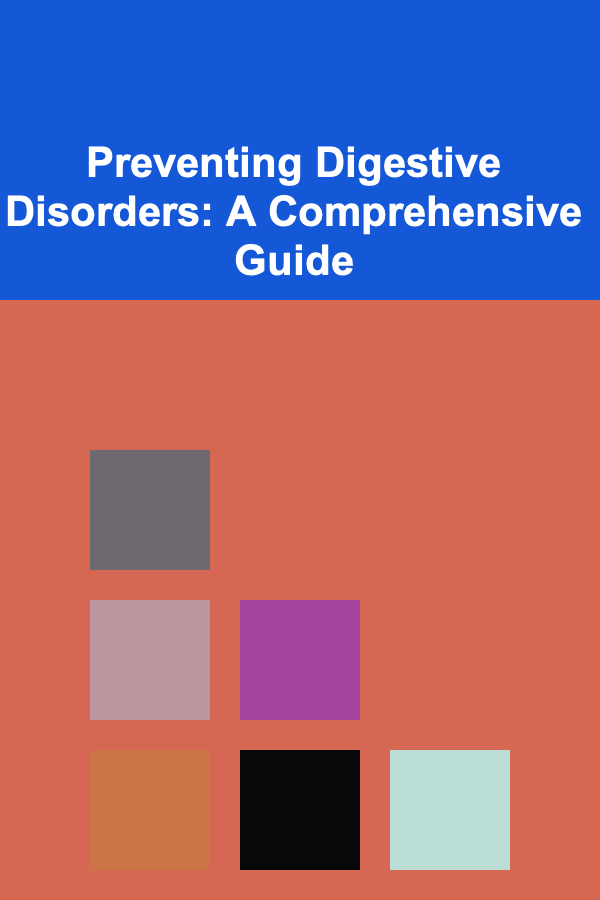
Preventing Digestive Disorders: A Comprehensive Guide
ebook include PDF & Audio bundle (Micro Guide)
$12.99$9.99
Limited Time Offer! Order within the next:

Digestive disorders are a common health concern affecting millions worldwide. These conditions can range from mild discomfort to debilitating illnesses, impacting quality of life and overall well-being. While some digestive disorders are genetically predisposed, many can be prevented or effectively managed through proactive lifestyle choices and dietary modifications. This comprehensive guide explores the various strategies and practices individuals can adopt to safeguard their digestive health and minimize the risk of developing digestive disorders.
Understanding the Digestive System and Common Disorders
The digestive system is a complex and intricate network of organs responsible for breaking down food, absorbing nutrients, and eliminating waste. It consists of the mouth, esophagus, stomach, small intestine, large intestine (colon), rectum, and anus, along with accessory organs like the liver, gallbladder, and pancreas. A disruption in the normal function of any of these components can lead to a variety of digestive disorders. Understanding the basics of how digestion works helps to pinpoint areas vulnerable to problems and formulate effective preventive strategies.
Some of the most prevalent digestive disorders include:
- Gastroesophageal Reflux Disease (GERD): Characterized by frequent heartburn and regurgitation due to stomach acid flowing back into the esophagus.
- Irritable Bowel Syndrome (IBS): A functional gastrointestinal disorder causing abdominal pain, bloating, gas, diarrhea, and/or constipation without any detectable structural abnormalities.
- Inflammatory Bowel Disease (IBD): A group of chronic inflammatory conditions affecting the digestive tract, including Crohn's disease and ulcerative colitis.
- Constipation: Infrequent bowel movements and difficulty passing stools.
- Diarrhea: Frequent, loose, and watery stools.
- Celiac Disease: An autoimmune disorder triggered by gluten, a protein found in wheat, barley, and rye.
- Diverticulitis: Inflammation or infection of pouches (diverticula) that form in the wall of the colon.
- Gallstones: Hardened deposits that form in the gallbladder.
- Peptic Ulcers: Sores that develop in the lining of the stomach, esophagus, or small intestine.
While the exact causes of many digestive disorders remain complex and multifactorial, several risk factors are consistently implicated, including diet, stress, lifestyle habits, genetics, and certain medications. By addressing these risk factors through preventive measures, individuals can significantly reduce their susceptibility to digestive problems.
Dietary Strategies for Digestive Health
Diet plays a pivotal role in digestive health. The foods we consume directly impact the gut microbiome, intestinal lining, and overall digestive function. Adopting a balanced and mindful approach to eating can significantly minimize the risk of digestive disorders.
Fiber-Rich Diet
Fiber is an indigestible carbohydrate that promotes healthy bowel movements, prevents constipation, and nourishes beneficial gut bacteria. It adds bulk to the stool, making it easier to pass, and helps to regulate bowel regularity. There are two main types of fiber: soluble and insoluble.
- Soluble fiber dissolves in water and forms a gel-like substance, helping to lower cholesterol and stabilize blood sugar levels. Good sources include oats, beans, lentils, apples, and citrus fruits.
- Insoluble fiber does not dissolve in water and adds bulk to the stool, promoting regular bowel movements. Good sources include whole wheat, bran, vegetables, and nuts.
Aim for a daily intake of 25-30 grams of fiber from a variety of sources. Gradually increase your fiber intake to avoid gas and bloating. Drinking plenty of water is also crucial for fiber to work effectively.
Hydration is Key
Water is essential for proper digestion. It helps to soften stools, preventing constipation, and aids in the absorption of nutrients. Dehydration can lead to a variety of digestive problems, including constipation, indigestion, and bloating.
Aim to drink at least 8 glasses of water per day. Increase your fluid intake during exercise, hot weather, or when consuming high-fiber foods. Other hydrating beverages include herbal teas, clear broths, and fruit-infused water.
Limit Processed Foods, Sugar, and Saturated Fats
Processed foods are often high in sugar, saturated fats, and artificial additives, which can disrupt the gut microbiome and contribute to inflammation. Excessive sugar intake can feed harmful bacteria in the gut, leading to imbalances and digestive problems. Saturated fats can slow down digestion and increase the risk of constipation.
Minimize your intake of processed foods, sugary drinks, fast food, and foods high in saturated fats. Opt for whole, unprocessed foods whenever possible, such as fruits, vegetables, lean proteins, and whole grains.
Identify and Avoid Trigger Foods
Certain foods can trigger digestive symptoms in susceptible individuals. Common trigger foods include gluten, dairy, caffeine, alcohol, spicy foods, and fatty foods. Keeping a food diary can help you identify which foods are causing you problems.
If you suspect a food intolerance or sensitivity, consider working with a registered dietitian or healthcare professional to develop an elimination diet or undergo food sensitivity testing. Once you identify your trigger foods, avoid them or limit your intake to minimize digestive discomfort.
Probiotics and Prebiotics
Probiotics are live microorganisms that can benefit the gut microbiome. They help to restore balance to the gut flora, improve digestion, and boost the immune system. Probiotic-rich foods include yogurt, kefir, sauerkraut, kimchi, and kombucha. Probiotic supplements are also available, but it's important to choose a high-quality product with a variety of strains.
Prebiotics are non-digestible fibers that feed beneficial gut bacteria. They act as a food source for probiotics, promoting their growth and activity. Prebiotic-rich foods include onions, garlic, leeks, asparagus, bananas, and oats.
Consuming both probiotics and prebiotics can create a synergistic effect, promoting a healthy and diverse gut microbiome.
Mindful Eating
Mindful eating involves paying attention to your food and the eating experience. It encourages you to eat slowly, savor each bite, and listen to your body's hunger and fullness cues. Mindful eating can improve digestion, reduce overeating, and enhance your enjoyment of food.
To practice mindful eating, eliminate distractions such as television and smartphones. Focus on the taste, texture, and aroma of your food. Chew your food thoroughly and eat slowly. Stop eating when you feel satisfied, not overly full.
Lifestyle Modifications for Digestive Health
In addition to diet, certain lifestyle habits can significantly impact digestive health. Making positive changes to your daily routine can help to prevent digestive disorders and improve overall well-being.
Stress Management
Stress can have a profound impact on the digestive system. It can disrupt gut motility, alter gut bacteria, and increase inflammation. Chronic stress can contribute to a variety of digestive problems, including IBS, GERD, and ulcers.
Practice stress-reducing techniques such as:
- Meditation: Regular meditation can calm the mind and reduce stress hormones.
- Yoga: Yoga combines physical postures, breathing exercises, and meditation to promote relaxation and reduce stress.
- Deep Breathing Exercises: Deep breathing can help to activate the parasympathetic nervous system, which promotes relaxation and slows down heart rate.
- Spending Time in Nature: Studies have shown that spending time in nature can reduce stress and improve mood.
- Engaging in Hobbies: Participating in activities you enjoy can help to take your mind off stressful situations and promote relaxation.
Regular Exercise
Regular physical activity can improve digestion, reduce stress, and boost overall health. Exercise helps to stimulate gut motility, preventing constipation and promoting regular bowel movements. It can also reduce inflammation and improve the balance of gut bacteria.
Aim for at least 30 minutes of moderate-intensity exercise most days of the week. Activities such as walking, jogging, swimming, cycling, and dancing can all be beneficial.
Adequate Sleep
Sleep deprivation can disrupt the gut microbiome, increase inflammation, and impair digestive function. Lack of sleep can also increase stress hormones, which can further exacerbate digestive problems.
Aim for 7-8 hours of quality sleep per night. Establish a regular sleep schedule, create a relaxing bedtime routine, and avoid caffeine and alcohol before bed.
Avoid Smoking
Smoking can damage the digestive tract and increase the risk of various digestive disorders, including ulcers, GERD, and Crohn's disease. Smoking weakens the lower esophageal sphincter, allowing stomach acid to flow back into the esophagus. It can also impair gut motility and increase inflammation.
Quitting smoking is one of the best things you can do for your digestive health and overall well-being. Talk to your doctor about resources and support to help you quit.
Limit Alcohol Consumption
Excessive alcohol consumption can irritate the digestive tract, damage the liver, and increase the risk of digestive disorders such as gastritis, pancreatitis, and liver disease. Alcohol can also weaken the lower esophageal sphincter, leading to GERD.
If you choose to drink alcohol, do so in moderation. For women, this means no more than one drink per day. For men, this means no more than two drinks per day.
Specific Preventive Strategies for Common Digestive Disorders
While the aforementioned general strategies apply to preventing most digestive disorders, some conditions benefit from specific preventive approaches.
Preventing GERD
- Avoid lying down immediately after eating: Wait at least 2-3 hours after eating before lying down.
- Elevate the head of your bed: This can help to prevent stomach acid from flowing back into the esophagus while you sleep.
- Avoid tight-fitting clothing: Tight clothing can put pressure on the stomach, increasing the risk of acid reflux.
- Manage your weight: Excess weight can put pressure on the stomach, increasing the risk of GERD.
- Limit caffeine and alcohol intake: These can relax the lower esophageal sphincter.
Preventing Constipation
- Increase your fiber intake: Aim for 25-30 grams of fiber per day.
- Drink plenty of water: Stay adequately hydrated.
- Engage in regular exercise: Physical activity stimulates bowel movements.
- Establish a regular bowel routine: Try to go to the bathroom at the same time each day.
- Consider a stool softener: If lifestyle changes are not enough, talk to your doctor about using a stool softener.
Preventing Diverticulitis
- High-fiber diet: Focus on fruits, vegetables, and whole grains. Historically, some believed avoiding nuts and seeds was beneficial, but current research doesn't strongly support this restriction.
- Hydration: Drinking plenty of fluids keeps stools soft and easier to pass.
- Regular exercise: Promotes healthy bowel function.
- Avoid prolonged straining during bowel movements: This increases pressure in the colon.
Managing IBS
While IBS is a chronic condition, symptoms can be managed and flare-ups can be minimized through preventive strategies:
- Identify and avoid trigger foods: Keeping a food diary can help. Common triggers include FODMAPs (fermentable oligosaccharides, disaccharides, monosaccharides, and polyols), gluten, dairy, caffeine, and artificial sweeteners.
- Manage stress: Stress can exacerbate IBS symptoms.
- Follow a low-FODMAP diet: This diet restricts foods that are high in FODMAPs, which are poorly absorbed in the small intestine and can cause gas, bloating, and diarrhea. Consider working with a registered dietitian to ensure nutritional adequacy on this restrictive diet.
- Consider probiotics: Some probiotic strains may help to reduce IBS symptoms. Talk to your doctor or a registered dietitian about which strains might be right for you.
- Regular exercise: Promotes overall well-being and may improve gut motility.
Preventing Celiac Disease
Celiac disease is an autoimmune disorder, and there is no known way to prevent it in genetically predisposed individuals. However, early diagnosis and adherence to a strict gluten-free diet are crucial for managing the condition and preventing long-term complications.
The Role of Medical Professionals
While lifestyle and dietary modifications can go a long way in preventing digestive disorders, it is crucial to seek professional medical advice when necessary. Regular check-ups with your doctor can help to identify potential problems early on and ensure prompt treatment.
Consult a healthcare professional if you experience any of the following symptoms:
- Persistent abdominal pain
- Changes in bowel habits (diarrhea, constipation, or both)
- Blood in the stool
- Unexplained weight loss
- Persistent heartburn or indigestion
- Nausea and vomiting
- Difficulty swallowing
Early diagnosis and treatment are essential for managing digestive disorders and preventing complications. Your doctor may recommend diagnostic tests such as endoscopy, colonoscopy, stool tests, or blood tests to determine the underlying cause of your symptoms. They can then develop a personalized treatment plan that may include medication, dietary changes, and lifestyle modifications.
Furthermore, consider seeking guidance from a registered dietitian for personalized dietary advice. A dietitian can help you identify trigger foods, develop a balanced meal plan, and ensure you are meeting your nutritional needs.
Conclusion: Proactive Steps for a Healthier Gut
Preventing digestive disorders is an ongoing process that requires a proactive and holistic approach. By incorporating healthy dietary habits, lifestyle modifications, and regular medical check-ups, individuals can significantly reduce their risk of developing digestive problems and improve their overall quality of life. Remember that small, consistent changes can make a big difference in the long run. By prioritizing your digestive health, you are investing in your overall well-being and paving the way for a healthier and happier future. Listen to your body, pay attention to your symptoms, and seek professional help when needed. A healthy gut is the foundation for a healthy body and mind.
Reading More From Our Other Websites
- [Organization Tip 101] How to Organize Your Travel Essentials for Hassle-Free Trips
- [Organization Tip 101] How to Use Multi-functional Furniture in Shared Areas
- [Personal Care Tips 101] How to Make Your Kitchen Weight-Loss-Friendly
- [Organization Tip 101] What Steps Can You Take to Keep Your Fridge Organized?
- [Home Budget 101] How to Track Your Home Spending with Apps
- [Needle Felting Tip 101] Step-by-Step Guide: Needle-Felt Any Shape in Just 5 Easy Stitches
- [Home Pet Care 101] How to Handle a Pet Emergency: A Quick Guide for Calm Action
- [Mindful Eating Tip 101] Mindful Eating Affirmations for Overcoming Emotional Cravings
- [Organization Tip 101] How to Maximize Vertical Space in Your Pantry
- [Personal Care Tips 101] Managing Chronic Pain Through Diet and Exercise

Effective Strategies for Lowering Credit Card Interest Rates and Saving Money
Read More
How to Plan a Last-Minute Party Without Losing Your Cool
Read More
How to Soundproof a Home Office for Maximum Focus
Read More
How to Teach Kids a New Skill Together as a Family
Read More
How To Learn New Programming Languages Quickly
Read More
10 Must-Have Tech Items Checklist for Your Cruise
Read MoreOther Products

Effective Strategies for Lowering Credit Card Interest Rates and Saving Money
Read More
How to Plan a Last-Minute Party Without Losing Your Cool
Read More
How to Soundproof a Home Office for Maximum Focus
Read More
How to Teach Kids a New Skill Together as a Family
Read More
How To Learn New Programming Languages Quickly
Read More